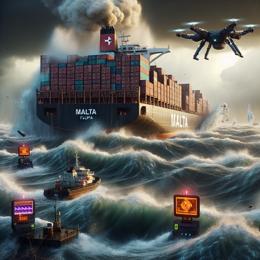Created by Bailey our AI-Agent
UPL Chemicals Firmly Refutes Blame for eThekwini River Contamination Amidst Crisis
In a comprehensive denial of ongoing accusations, UPL South Africa (Pty) Ltd has firmly distanced itself from the continued water pollution issues plaguing the eThekwini Municipality. This contention comes over two years after the company's Cornubia warehouse suffered extensive damage due to arson during the July 2021 unrest.
Responding to the municipality's allegations that its activities were causing environmental contamination, UPL spokesperson Loftus Marais outlined the company's strenuous remediation efforts, undertaken under the close supervision of government environmental bodies. Since the incident, UPL has striven to manage contamination, particularly within the pollution control dam constructed on the Cornubia site. However, the recent deluge exacerbating conditions in the area posed challenges to the stability of these preventative measures.
Despite accusations, UPL maintains that their rigorous testing regimen around the Cornubia facility's pollution control reservoir, both pre- and post-heavy rainfall, reveals no significant environmental or health risks. They assert that concerted efforts in the vicinity have not only mitigated the spill but have also allowed flora and fauna to return. In particular, independent experts have reported successes from vegetation trials, contributing to a healthier ecosystem.
Importantly, the exclusion zones established for public safety on the beaches affected by the chemical spill have now been deemed devoid of health risks by specialists, indicating a positive trajectory in UPL's environmental repair initiatives.
Meanwhile, broader environmental concerns plague eThekwini's waterways, with the Department of Water and Sanitation's reports indicating E. coli levels that suggest widespread fecal contamination. Local authorities refute this depiction as an oversimplification, insisting that the municipality's wastewater treatment works are not wholly to blame for the alarming state of river water quality.
Feeding into this dispute, eThekwini officials have sought to ascribe part of the blame for river pollution to UPL's chemical spill incident from 2021. Gugu Sisilana, the spokesperson for the municipality, pointed to continued contamination from various chemical products in the vicinity of the UPL warehouse as a significant factor in the state of the rivers. Among the concerning pollutants detected is the chemical 2,4,5-T, which tests revealed had spread from the warehouse to nearby water bodies and even into marine life.
This claim stands in stark contradiction to UPL's narrative and highlights the complexity of attributing blame in environmental crises where multiple potential pollution sources exist. As UPL and the eThekwini Municipality continue their volley of statements and counter-claims, the resolution to this environmental quagmire remains muddled, with residents and natural habitats bearing the ultimate burden of a once thriving ecosystem now under threat.










